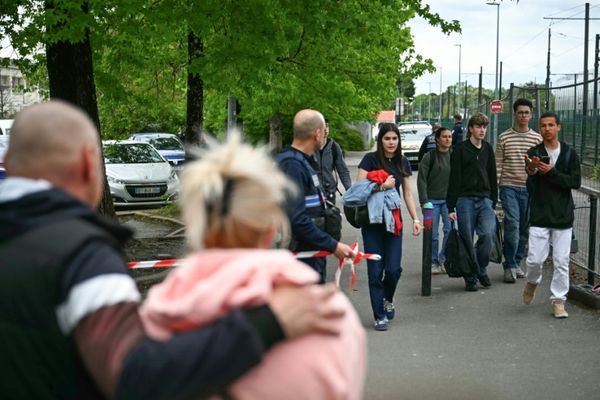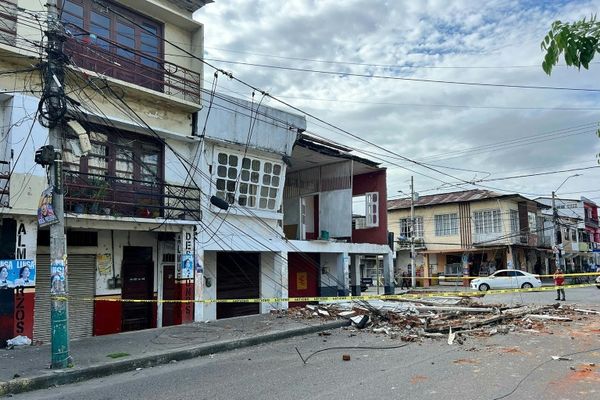Western Australia will no longer require casual contacts to be tested when it moves to an as-yet-undefined "high caseload" of COVID-19 cases, under changes announced as the state recorded 14 new local infections.
Five of the new cases, which are linked to an event at Perth nightclub The Library, were announced late on Friday afternoon and will be officially recorded in Saturday's case numbers.
Premier Mark McGowan announced the future rule changes following a meeting of the State Disaster Council.
He said the new casual contact definition would mean that if someone was at an exposure site at the same time as a positive case, it would not be a reason for forced testing and isolation.
"That being said, it is important to keep checking in at venues in the future," Mr McGowan said.
"Because if you have been to an exposure site, it is important to monitor for symptoms and in the event you develop them, go and get tested."
Twelve of WA's 14 new local COVID-19 cases have been linked to the existing Omicron outbreak, and they include two in the Wheatbelt — one in Cunderdin and one in Goomalling.
One case is a close contact of the Willagee IGA sub-cluster in Perth.
Another new case is a close contact of the Coolbellup cluster.
Eight are linked to a nightclub cluster — seven from The Library club in Northbridge and one from the Hip-E club in Leederville.
WA Health said late on Friday afternoon that transmission had occurred at The Library nightclub, with five positive cases confirmed after the day's COVID figures were released.
Anyone who attended the "Club Bootylicious" event at The Library from 9:30pm on Saturday, January 22, until 5am on Sunday, January 23, is urged to get tested immediately and isolate until receiving a negative result.
Mr McGowan said there were two more cases that were linked to the Omicron outbreak but it was not clear which cluster they were from. Several of the new infections were infectious in the community.
Close contact definition reworked
Mr McGowan said close contact rules would also change for WA in a future high caseload scenario.
A close contact will be defined in WA as "a household member or intimate partner of a person with COVID-19 that has had contact with them during the infectious period, or someone who has had close personal interaction with a person with COVID-19 during the infectious period".
A "close personal interaction" is defined as having had 15 minutes of face-to-face contact where a mask was not worn by either person, or having spent more than 2 hours in a small room with a case during the infectious period where masks have been removed for that period.
It could also apply if someone had been notified by WA Health that they were a close contact based on "specific circumstances", Mr McGowan said.
Isolation period to be slashed
WA will also halve the number of days positive cases are required to isolate, from 14 to seven.
If cases continue to be symptomatic they must remain isolated until they recover, but they can leave isolation after day seven if they are symptom-free.
After the seven-day mark, no further test will be required.
A close contact who is symptomatic must isolate for seven days from the point of exposure to a positive case.
They must take a PCR or rapid antigen test as soon as possible and if the test is positive, they must follow the positive case protocols.
If the result is negative, the person must take another RAT 24 hours later, and if that test is negative they must take a final RAT on day seven.
Close contacts who are not symptomatic only need to take a test on day seven, before leaving isolation.
Critical staff to stay in 'last resort' measure
Mr McGowan said in a "very high caseload environment", WA would also designate critical staff who could continue to work if they were close contacts but were asymptomatic.
He said this was not a measure designed to keep normal business operations going, but was rather a measure of "last resort" to ensure critical services continued.
He said these rules would only apply to roles that were critical to the COVID-19 response, in services that prevented significant harm or roles that ensured continued access to essential goods and services.
Those industries included:
- Transport
- Food and beverages
- Pharmaceutical supplies
- Agriculture
- Critical resources
- Power utilities and waste management services
- Corrective and judicial services
- Police and emergency services
- Schools and childcare
- Healthcare services
- Social assistance in residential care
- Veterinary services
- Funeral services
- Crematorium and cemetery services
- Defence and defence-related industries.
These workers must return a negative RAT daily, wear a surgical mask outside the home, travel alone if possible and isolate when outside of work.
If symptoms develop, they must stop working and follow the close contact symptomatic rules.
Unclear when new rules will kick in
When asked whether he could give a "ballpark" figure on when case numbers would trigger the new definitions and rules, Mr McGowan said it was difficult.
“What we will do is analyse the case numbers, analyse the extent to which they are linked, the extent to which the source of infection is known … and the total amount of time cases are infectious in the community before putting in place our new rules," he said.
“It would basically be irresponsible and reckless to put in place a hard rule, because there are so many variables we can take into account."
The Premier said the 14-day isolation period remained in place in WA for now, describing the situation as a "balancing act".
"If we put in place these new close contact rules … they are for a higher caseload environment when you need people who are perhaps more risky [of being COVID-positive] to be at work and doing their jobs," he said.
"At this point in time that is not the situation in Western Australia."
Chamber of Commerce and Industry WA chief economist Aaron Morey welcomed the reduction in the isolation period and dropping the casual contact category.
"It seems to me that they've tried to define close contact in a way that means that if there is a COVID-positive person on a factory floor or in an office, it doesn't necessarily mean that everyone in that setting closes," he said.
"They clearly understand we need to keep the economy moving and ticking along in the face of that eventual rising outbreak.
"We'd like to move away from the 14-day period — WA is a bit of an outlier in that."
New definitions don't impact border
WA had been due to remove its hard border with other states on February 5, but last week that decision was revoked and the border remains in place.
Mr McGowan said even if WA reached high community numbers, that would "not necessarily" make the border redundant.
"Border arrangements are crucial whilst the eastern states is peaking to keeping caseloads and case numbers here down," he said.
He defended his decision to maintain the border in the face of conditions in the east.
"I foreshadowed that back in December to you all standing in this room, that if there was an emergency or a catastrophe, and I think it is over there, over east, then we would change position," he said.
“Obviously it’s had some blowback and pushback, but I didn’t want to deliberately bring in something whilst we had low third dose rates that would kill large numbers, in particular, of older West Australians.”
School rules aim to keep classrooms open
WA Education Minister Sue Ellery said close contact rules for school staff and students were aimed at keeping schools open amid high case numbers in the community.
"It does recognise that schools and early-year services are critical, providing face-to-face learning to students for their social development and mental health, and supporting the economy so parents can work," she said.
Under the rules, which Ms Ellery stressed did not apply on the first day of school next week, there were three categories of contact, with a positive case determined by a RAT or PCR test:
- Classroom contact — Staff and students who share a classroom for a minimum of one period
- One-on-one contact — Student and staff who have worked one-on-one, and facemasks were not "consistently worn"
- Workplace contact — Staff or other workers who spend more than 15 minutes indoors without a mask
The rules for each category, described by Ms Ellery as stricter than national rules, will differ according to levels of exposure to a positive case.
A staff member who is asymptomatic after a one-on-one contact must isolate and take a RAT on day six. If the test is clear, they can leave isolation on day seven.
But asymptomatic staff who are exposed via a classroom or workplace contact can continue to work.
However, they must take a RAT daily for seven days and quarantine when not at work.
They must also wear a surgical mask and travel alone to work if possible.
Meanwhile, students who are asymptomatic after exposure are encouraged to keep attending school.
"They [students] should avoid, if possible, out-of-hours child care, extracurricular activities or public transport for seven days," Ms Ellery said.
She said the state would provide necessary RATs to all schools.
Ms Ellery said while she was aware of programs in Victoria and New South Wales where students were being routinely tested to monitor for any potential outbreak, this was not the current policy for WA.
"We will give further consideration to the further use of RATs based on the CHO's advice and how the pilots in NSW and Victoria work," she said.







